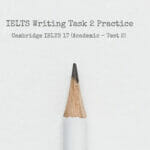1. Introduction
In IELTS Writing Task 2, an off-topic response refers to an essay that, while related to the topic, does not directly address or answer the specific question or requirements of the prompt. An off-topic essay may discuss the general subject matter but fail to address the specific aspects, views, or arguments that the prompt asks the candidate to discuss.
An off-topic response in IELTS Writing Task 2 can negatively impact the candidate’s score, particularly in the Task Achievement criterion. Task Achievement assesses the extent to which
- the candidate has addressed the task,
- provided a clear position or opinion,
- and developed their response with relevant, extended, and well-supported ideas.
Failure to address the prompt directly may result in a low Task Achievement score, which can significantly affect the candidate’s overall band score for the writing task.
2. An example of an off-topic essay:
Prompt: Many people believe that the government should spend more money on improving public transportation, while others argue that the government should prioritize funding for the development of private cars. Discuss both views and give your own opinion.
In modern society, transportation plays a critical role in ensuring the smooth functioning of daily activities. Public transportation and private cars are the two primary modes of transportation that people rely on to travel between destinations. In this essay, I will discuss the advantages of both public transportation and private cars, highlighting their benefits and convenience.
Public transportation, such as buses, trains, and subways, offers numerous advantages. First, it provides an affordable means of transportation for people from all walks of life. This accessibility allows individuals to travel to work, school, or leisure activities without breaking the bank. Second, public transportation is an eco-friendly option as it reduces the overall number of vehicles on the road, leading to lower greenhouse gas emissions and decreased air pollution. Additionally, public transportation can help reduce traffic congestion, as fewer cars on the road lead to smoother traffic flow.
On the other hand, private cars provide a level of comfort and convenience that public transportation cannot match. Private car owners have the freedom to travel at any time without depending on schedules or routes, allowing for greater flexibility in their daily lives. Moreover, private cars offer a sense of privacy and personal space that is not always available on public transportation. This personal space can make traveling more enjoyable and less stressful, especially during long commutes or trips.
Furthermore, private cars can provide increased safety, as individuals have more control over their environment and can avoid potential hazards associated with public transportation, such as crowded spaces and delays. Car owners can also customize their vehicles to fit their specific needs and preferences, adding another layer of personalization and comfort to their mode of transportation.
In conclusion, both public transportation and private cars offer unique advantages and benefits to their users. Public transportation provides an affordable, eco-friendly alternative, while private cars offer convenience, comfort, and personalization. It is essential for individuals to weigh the pros and cons of each mode of transportation to determine which option best suits their needs and lifestyle.
3. Why is this essay off-topic?
To understand why the sample essay is off-topic, we need to compare it to the prompt’s requirements and see how it deviates from them.
Prompt: Many people believe that the government should spend more money on improving public transportation, while others argue that the government should prioritize funding for the development of private cars. Discuss both views and give your own opinion.
The prompt asks the candidate to discuss two opposing views:
- The belief that the government should spend more money on improving public transportation.
- The argument that the government should prioritize funding for the development of private cars.
Additionally, the prompt asks the candidate to provide their own opinion on the matter.
The introduction provides a general context about transportation and mentions public transportation and private cars. However, it does not introduce the two specific views to be discussed, as required by the prompt. It fails to mention the debate regarding government spending priorities.
The first body paragraph focuses on the advantages of public transportation. While this is related to the topic, it does not address the view that the government should spend more money on improving public transportation. It only describes the benefits without discussing the funding aspect.
The second body paragraph discusses the advantages of private cars. Similar to the first body paragraph, it is related to the topic but does not address the view that the government should prioritize funding for the development of private cars. The paragraph only highlights the benefits without connecting them to the government spending debate.
The conclusion summarizes the advantages of both public transportation and private cars, but it does not provide the candidate’s opinion on whether the government should prioritize spending on public transportation or private cars, as required by the prompt.
In summary, the sample essay is off-topic because it does not directly address the two opposing views presented in the prompt and does not provide the candidate’s opinion on the matter. Instead, it focuses on the advantages of public transportation and private cars, which, while related to the topic, does not answer the specific Task 2 question asked about government spending priorities.
4. Assessment based on writing task 2 scoring criteria
Here’s a general assessment of the off-topic sample essay based on the four assessment criteria used for IELTS Writing Task 2:
Task Achievement: The essay is off-topic, as it does not address the specific requirements of the prompt. The writer fails to discuss the two views about government spending priorities and does not provide their own opinion on the matter. Therefore, the score for Task Achievement would likely be low.
Coherence and Cohesion: The essay is well-organized, with clear paragraphing and a logical progression of ideas. Transitions are used effectively, and the ideas within each paragraph are connected. However, the essay’s overall coherence is affected by its failure to address the prompt directly. The score for Coherence and Cohesion would likely be moderate to low.
Lexical Resource: The writer demonstrates a good range of vocabulary, with appropriate word choices and no significant errors. The essay shows an ability to use less common words and phrases. The score for Lexical Resource would likely be good.
Grammatical Range and Accuracy: The essay showcases a variety of sentence structures and generally accurate grammar, with no major errors. The score for Grammatical Range and Accuracy would likely be good.
Based on these general assessments, the essay would receive a mixed evaluation, with low scores for Task Achievement and moderate to good scores for the other criteria. It is essential to remember that IELTS Writing Task 2 scores are calculated by averaging the scores across all four criteria. Since Task Achievement is significantly low due to the essay being off-topic, the overall score would likely be adversely affected.
5. How to avoid writing off-topic responses
To avoid writing off-topic essays in IELTS Writing Task 2, consider the following strategies:
Carefully read and analyze the prompt: Before you start writing, read the prompt multiple times to ensure you understand the specific requirements, views, or arguments you need to address. Identify the key aspects of the question to focus on in your essay.
Plan your essay: Outline your essay before you start writing. Create a brief plan that includes the introduction, main body paragraphs, and conclusion. Ensure that each body paragraph focuses on one aspect of the prompt, such as discussing a specific view or argument.
Keep the prompt in mind: As you write your essay, keep referring back to the prompt to ensure that you stay on topic. Ask yourself:
- whether the points you’re making directly address the question and
- whether your examples and explanations are relevant to the task.
Be specific and focused: Avoid discussing general ideas or concepts that are not directly related to the prompt. Instead, focus on specific examples, arguments, or evidence that:
- directly address the question and
- support your position.
Write a clear thesis statement: In your introduction, include a clear thesis statement that outlines the main points you will discuss in your essay. This statement should directly respond to the prompt and set the direction for the rest of your essay.
Connect your paragraphs to the prompt: Begin each body paragraph with a clear topic sentence that relates to the prompt and sets the focus for the paragraph. Make sure your examples and explanations:
- support your topic sentence and
- directly address the task.
Review and revise your essay: After writing your essay, read it through and check whether you have directly addressed the prompt throughout the text. If you find any off-topic or irrelevant points, revise them to ensure they align with the task.
By following these strategies, you can minimize the chances of writing off-topic essays and ensure that your response effectively addresses the specific requirements of the IELTS Writing Task 2 prompt.
6. A few more examples
Off-topic Sample Essay 1
Prompt: Some people think that parents should teach children how to be good members of society. Others, however, believe that school is the place to learn this. Discuss both views and give your own opinion.
Sample essay:
Raising well-rounded, responsible, and socially-conscious children is an essential goal for parents and educators. The development of good character and values is a vital aspect of a child’s upbringing, as it lays the foundation for their future success and happiness. In this essay, I will discuss the importance of moral education, its various aspects, and the role it plays in shaping the next generation.
Moral education encompasses a wide range of topics, including honesty, respect, empathy, and responsibility. These values are crucial for children to learn, as they help them navigate social situations, develop healthy relationships, and contribute positively to their communities. Furthermore, cultivating these values from a young age can help children grow into responsible and compassionate adults.
One of the primary ways children learn moral values is by observing the actions and behaviors of their parents and other caregivers. As role models, parents play a crucial role in demonstrating and reinforcing moral behaviors through their everyday interactions with their children. This includes teaching children about the importance of honesty, kindness, and empathy, as well as providing guidance on how to handle challenging situations and make ethical decisions.
In addition to parents, schools can also play a significant role in imparting moral education. Through various educational programs and activities, schools can expose children to different cultures, beliefs, and values, fostering a sense of understanding, tolerance, and respect for diversity. Furthermore, schools can provide opportunities for children to develop critical thinking skills and engage in discussions about ethical issues and social responsibility.
In conclusion, moral education is an essential aspect of a child’s upbringing, as it helps shape their character and values. Parents and schools both play critical roles in promoting moral education, fostering a sense of responsibility, empathy, and respect for others. By working together, parents and educators can ensure that children grow into well-rounded, socially-conscious adults who contribute positively to their communities.
Analysis:
Let’s analyze the off-topic essay in relation to the prompt to understand why it fails to address the task:
Prompt: Some people think that parents should teach children how to be good members of society. Others, however, believe that school is the place to learn this. Discuss both views and give your own opinion.
The prompt asks the candidate to discuss two specific views:
- The belief that parents should teach children how to be good members of society.
- The belief that schools are the place for children to learn how to be good members of society.
Additionally, the prompt requires the candidate to provide their own opinion on the matter.
Now, let’s examine the off-topic essay:
The introduction talks about the importance of moral education, character development, and the roles of parents and educators. However, it does not mention the two specific views to be discussed, as required by the prompt. The essay fails to acknowledge the debate between the role of parents and schools in teaching children to be good members of society.
The first body paragraph discusses the various aspects of moral education, such as honesty, respect, empathy, and responsibility. While these topics are related to the overall subject of teaching children to be good members of society, they do not address the view that parents should be the ones to teach these values.
The second body paragraph talks about the role of parents in modeling moral behaviors and the importance of their guidance in shaping their children’s character. Although it does touch upon the role of parents, it does not explicitly state or discuss the view that parents should teach children how to be good members of society.
The third body paragraph discusses the role of schools in imparting moral education and promoting diversity and critical thinking. However, it does not directly address the view that schools should be the place for children to learn how to be good members of society.
The conclusion summarizes the importance of moral education and the roles of both parents and schools, but it does not provide the candidate’s opinion on whether parents or schools should be responsible for teaching children to be good members of society, as required by the prompt.
In summary, the sample essay is off-topic because it does not directly address the two opposing views presented in the prompt, and it does not provide the candidate’s opinion on the matter. The essay discusses the importance of moral education and the roles of both parents and schools but does not specifically address the question of which entity should be responsible for teaching children to be good members of society. While the essay is related to the topic of teaching children values, it does not answer the specific Task 2 question asked.
Off-topic Sample Essay 2
Prompt: In some countries, more and more people are choosing to live alone nowadays than in the past. Do you think this is a positive or negative development? Do the advantages of living alone outweigh the disadvantages?
Sample essay:
In recent years, there has been a growing trend of people opting to live alone, particularly in urban areas. This shift in living arrangements has sparked a debate about the implications of such a lifestyle. In this essay, I will discuss the importance of having a sense of community, the role of technology in modern living, and how this trend impacts society.
A sense of community is essential for human beings, as it fosters social connections and provides emotional support. Communities can be found in various forms, such as neighborhoods, schools, and workplaces. They offer opportunities for people to interact, share experiences, and learn from one another. This sense of belonging can significantly impact a person’s mental and emotional well-being, leading to a more fulfilling life.
Technological advancements have changed the way people live and communicate. The widespread use of the internet, smartphones, and social media platforms has made it easier for individuals to stay connected with friends and family, even when living alone. This connectivity allows people to maintain relationships and share experiences, despite not living with others.
However, this trend of living alone may have some consequences on society. For instance, it could lead to a decrease in social interactions and a decline in community engagement. Moreover, living alone may result in feelings of isolation and loneliness for some individuals, which could negatively affect their mental health.
In conclusion, while the trend of living alone has become more prevalent in recent years, it is essential to consider the importance of community and social connections. Technological advancements have facilitated communication and connectivity, but the potential impact on society and mental health must not be overlooked.
(281 words)
Analysis
Let’s analyze the off-topic essay in relation to the prompt to understand why it fails to address the task:
Prompt: In some countries, more and more people are choosing to live alone nowadays than in the past. Do you think this is a positive or negative development? Do the advantages of living alone outweigh the disadvantages?
The prompt asks the candidate to:
- Determine whether the increasing trend of living alone is a positive or negative development.
- Discuss whether the advantages of living alone outweigh the disadvantages.
Now, let’s examine the off-topic essay:
The introduction talks about the growing trend of living alone and its implications, but it does not mention whether the trend is positive or negative. Furthermore, it does not address the task of discussing the advantages and disadvantages of living alone.
The first body paragraph discusses the importance of having a sense of community and how it can impact a person’s well-being. While this is related to the broader subject of living arrangements, it does not directly address the advantages or disadvantages of living alone, as required by the prompt.
The second body paragraph talks about the role of technology in modern living and how it allows people to stay connected even when living alone. Although it touches upon an aspect that could be seen as an advantage of living alone, it does not explicitly discuss this as an advantage or compare it to any disadvantages.
The third body paragraph mentions some potential consequences of living alone on society, such as decreased social interactions and community engagement, as well as feelings of isolation and loneliness. However, it does not directly discuss these points as disadvantages of living alone or weigh them against any advantages.
The conclusion briefly reiterates the importance of community and the role of technology but does not answer the specific questions asked in the prompt, namely whether the trend of living alone is positive or negative and if the advantages outweigh the disadvantages.
In summary, the sample essay is off-topic because it does not directly address the questions posed in the prompt about whether living alone is a positive or negative development and if the advantages of living alone outweigh the disadvantages. Instead, the essay discusses the importance of community and the role of technology in modern living, which are related to the topic of living alone but do not answer the specific Task 2 question asked.
Off-topic Sample Essay 3
Prompt: Some people believe that it is better for children to grow up in the countryside rather than in a big city. To what extent do you agree or disagree with this statement?
Sample essay:
The environment in which children grow up has a significant impact on their development, well-being, and future success. The countryside and big cities offer different experiences and opportunities that can shape a child’s upbringing. In this essay, I will discuss the importance of nature, the influence of urban environments, and the role of community in a child’s life.
Exposure to nature has many benefits for children. It can provide opportunities for physical activity, which is essential for their physical and mental health. Spending time outdoors can also foster a sense of curiosity, imagination, and creativity in children, as they learn about the natural world and its processes. Furthermore, being in nature can help children develop a sense of responsibility for the environment and an appreciation for its beauty and resources.
On the other hand, urban environments offer a diverse range of experiences and opportunities that can enrich a child’s life. Big cities are often cultural hubs, providing access to museums, galleries, theaters, and other educational institutions. This exposure to different cultures and ideas can help broaden a child’s understanding of the world and encourage tolerance and empathy. Additionally, cities typically offer a wider range of schools, extracurricular activities, and resources that can enhance a child’s education and personal growth.
The role of community is also crucial in a child’s upbringing. Whether in the countryside or a big city, a strong sense of community can provide support, guidance, and a sense of belonging for children. Building relationships with neighbors, teachers, and peers can help children develop social skills, confidence, and resilience.
In conclusion, both the countryside and big cities have unique offerings that can contribute to a child’s development and well-being. A balanced exposure to nature, urban environments, and a strong sense of community is essential for nurturing well-rounded individuals.
(281 words)
Analysis
Let’s analyze the off-topic essay in relation to the prompt to understand why it fails to address the task:
Prompt: Some people believe that it is better for children to grow up in the countryside rather than in a big city. To what extent do you agree or disagree with this statement?
The prompt asks the candidate to:
- Discuss their agreement or disagreement with the statement that it is better for children to grow up in the countryside rather than in a big city.
Now, let’s examine the off-topic essay:
The introduction talks about the impact of the environment on children’s development, well-being, and future success. However, it does not mention the candidate’s stance on the statement that it is better for children to grow up in the countryside rather than in a big city.
The first body paragraph discusses the importance of nature and its benefits for children. Although it provides a perspective on the countryside environment, it does not directly address the candidate’s agreement or disagreement with the statement in the prompt.
The second body paragraph talks about the influence of urban environments and the opportunities they offer for children. While it touches upon the advantages of living in a big city, it does not explicitly express the candidate’s agreement or disagreement with the statement that it is better for children to grow up in the countryside rather than in a big city.
The third body paragraph discusses the role of community in a child’s life, whether in the countryside or a big city. While this topic is related to the overall subject of children’s upbringing, it does not directly address the candidate’s stance on the statement in the prompt.
The conclusion states that both countryside and big cities have unique offerings for children’s development and well-being, and emphasizes the importance of a balanced exposure to both environments. However, it does not answer the specific question asked in the prompt about the extent to which the candidate agrees or disagrees with the statement.
In summary, the sample essay is off-topic because it does not directly address the question posed in the prompt about whether it is better for children to grow up in the countryside rather than in a big city. Instead, the essay discusses the importance of nature, urban environments, and the role of community in children’s lives, which are related to the topic but do not answer the specific Task 2 question asked.
Avoiding off-topic essays in IELTS Writing Task 2 is crucial because it directly affects your Task Response score, which is a significant component of your overall band score. Writing off-topic may result in a lower score, as it demonstrates an inability to understand and address the given question, limiting your ability to showcase your language and argumentative skills effectively.





0 Comments